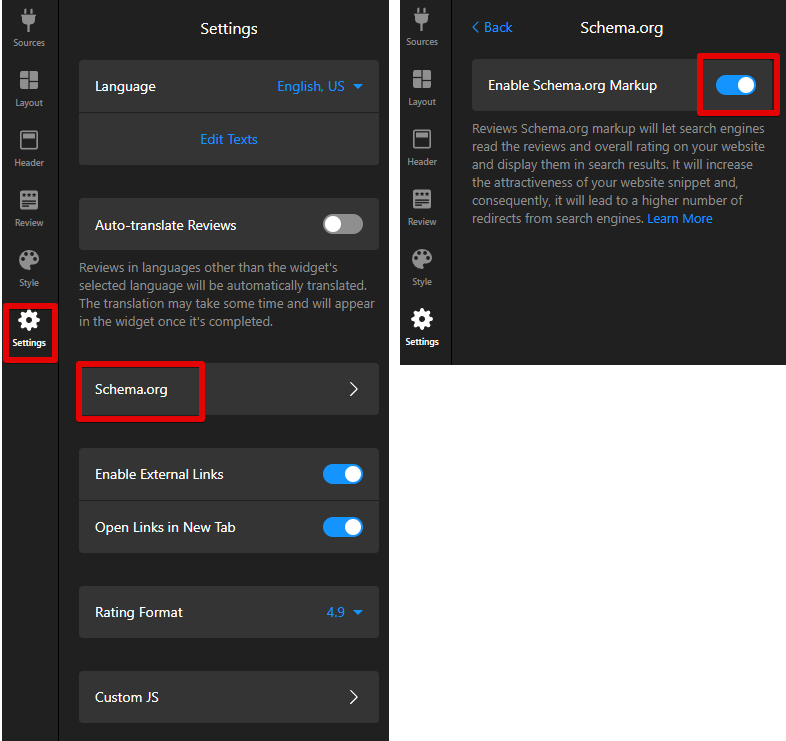SEO and Schema Markup in Elfsight Widgets
While Elfsight widgets are powerful tools for enhancing your website’s functionality, you may wonder about their impact on SEO and search visibility. This article explains how our widgets are SEO-friendly, introduces schema markup, and explores the specifics of certain widgets.
In this article
Elfsight Widgets and Their Role in SEO
Elfsight widgets are SEO-friendly and fully crawlable by search engines like Google. Modern search engines can render and index client-side JavaScript, meaning that all widget data is visible and indexable. The text within our widgets is embedded directly, not as images, ensuring search engines can index it just like regular text on your site.
For example, with a Reviews widget, Google can index review content. If users search for specific review text, your site may appear in search results, provided your website ranks well and the review contains relevant keywords.
While our widgets help with content visibility, they won't drastically improve SEO rankings on their own. SEO depends on many factors, and widgets are just one element of the strategy.
Understanding Schema Markup
In addition to making our widgets SEO-friendly, we use schema markup in some apps to enhance their visibility.
Schema markup is a type of microdata from Schema.org that helps search engines understand the content on your website. Adding simple code to your HTML tells search engines what’s on your page, whether it’s an article, event, product, or something else.
The markup also makes it easier for search engines to display additional details, like ratings, in search results, making your content more attractive to users.
To verify that your schema markup is working, use the Rich Results Test. This Google tool checks if search engines can read and display your markup correctly.
Schema Markup and Rich Snippets in Search Results
Rich snippets are enhanced search results that display extra information from schema markup. These details grab attention and make your listing more noticeable. For example, Reviews widgets can show star rating and the number of reviews directly in the search engine results page (SERP):

While schema markup doesn’t guarantee that your page will show a rich snippet, it greatly increases the chances. Rich snippets help your content stand out and can drive more traffic to your website.
Elfsight Widgets Using Schema Markup
Several Elfsight widgets incorporate schema markup to improve visibility in search results.
Note: For the FAQ, Event Calendar, and Blog widgets, schema is enabled by default.
For the Reviews widgets, you can manually toggle schema on or off in the Settings tab under the Schema.org section:

Below is an overview of the widgets that use schema markup and how rich snippets are displayed.
| App Name | Schema Type | Purpose | Tips for rich snippet |
|---|---|---|---|
| Reviews Apps
(including Testimonials Slider) |
Product Markup | Displays ratings and the number of reviews | Reviews generates the rich snippet by default.
Testimonials Slider requires you to fill in all fields manually. |
| FAQ | Question Markup | Structures Q&A for direct display in search results | ⚠️ Does not generate rich snippets due to changes in Google policies |
| Event Calendar | Event Markup | Structures event details, such as dates, times, and descriptions | ⚠️ Currently does not generate rich snippets in search results |
| Blog | Article Markup | Structures content like article titles, dates, and authors | ⚠️ Currently does not generate rich snippets in search results |
We hope this article was helpful! Elfsight widgets are SEO-friendly, and schema markup makes it easier for search engines to read your content — just keep in mind that the best results come from proper setup and matching what people are really searching for.
